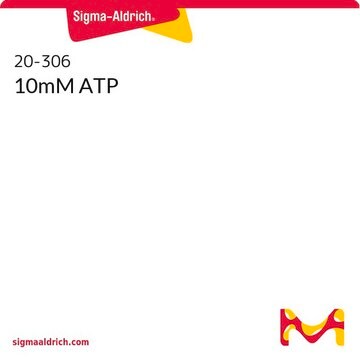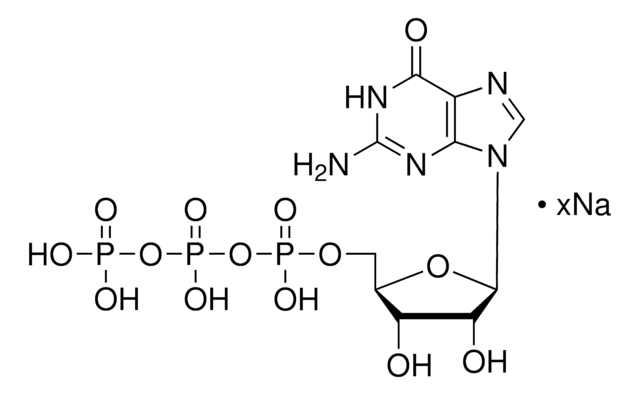FLAAS
Adenosine 5′-triphosphate (ATP) disodium salt hydrate
vial of ~1 mg ATP
Synonym(s):
ATP disodium hydrate
About This Item
Recommended Products
biological source
bacterial (Corynebacterium sp)
Quality Level
Assay
≥90%
form
lyophilized powder
packaging
vial of ~1 mg ATP
storage temp.
−20°C
SMILES string
Nc1ncnc2n(cnc12)[C@@H]3O[C@H](COP(O)(=O)OP(O)(=O)OP(O)(O)=O)[C@@H](O)[C@H]3O
InChI
1S/C10H16N5O13P3.2Na.H2O/c11-8-5-9(13-2-12-8)15(3-14-5)10-7(17)6(16)4(26-10)1-25-30(21,22)28-31(23,24)27-29(18,19)20;;;/h2-4,6-7,10,16-17H,1H2,(H,21,22)(H,23,24)(H2,11,12,13)(H2,18,19,20);;;1H2/q;2*+1;/p-2/t4-,6-,7-,10-;;;/m1.../s1
InChI key
NTBQNWBHIXNPRU-MSQVLRTGSA-L
Looking for similar products? Visit Product Comparison Guide
Related Categories
Application
- used as a standard to measure ATP by bioluminescence method
- used in kinase buffer to assess the interaction between death-associated protein kinases (DAPK2) and 14-3-3-β
- used as a standard in ATP colorimetric assay
Biochem/physiol Actions
Quantity
Preparation Note
Storage Class Code
11 - Combustible Solids
WGK
WGK 2
Flash Point(F)
Not applicable
Flash Point(C)
Not applicable
Personal Protective Equipment
Choose from one of the most recent versions:
Certificates of Analysis (COA)
Don't see the Right Version?
If you require a particular version, you can look up a specific certificate by the Lot or Batch number.
Already Own This Product?
Find documentation for the products that you have recently purchased in the Document Library.
Customers Also Viewed
Our team of scientists has experience in all areas of research including Life Science, Material Science, Chemical Synthesis, Chromatography, Analytical and many others.
Contact Technical Service









